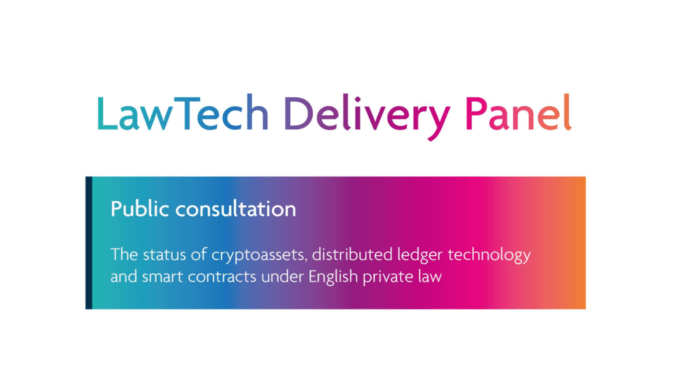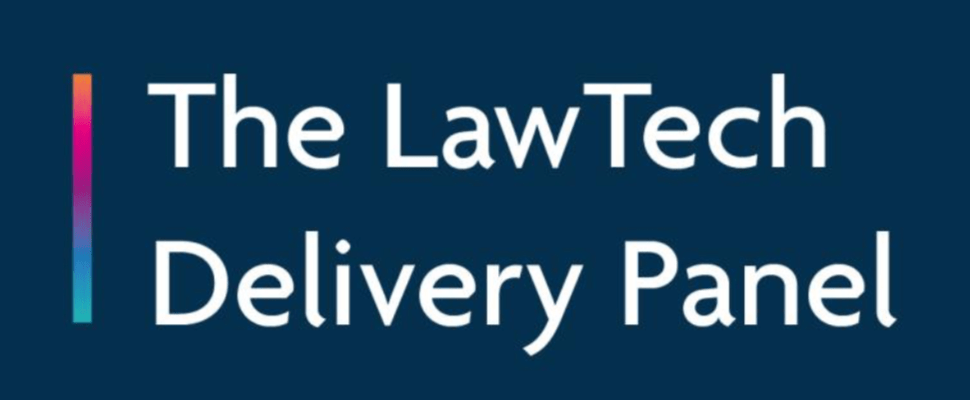
You have just over two weeks left to respond to the LawTech Delivery Panel’s UK Jurisdiction Taskforce (UKJT) consultation on the status of cryptoassets, DLT and smart contracts under English law. And, if you are interested in the future use of this technology then responding to the consultation could play an important part in its future legal underpinning, at least in the UK.
The LawTech Delivery Panel, which is backed by the Ministry of Justice and Law Society, among others, hopes to use the consultation to help in the preparation of an authoritative legal statement on the status of cryptoassets and smart contracts under English private law.
The UK’s top legal minds are rather excited by smart contracts in particular. One reason is that if they do take off, then those jurisdictions (and their lawyers) that have got all their legal ducks in a row and have everything ready for their use, will have an advantage globally when clients come looking for them in large numbers – as well as being first choice as a place for litigating any future disputes that may relate to their use in the wider business world in the UK, or elsewhere around the world.
The UK is also a bit nervous these days about its long-term position in the global legal market. It’s concerned about: Singapore’s national push to embrace legal tech and modernise its legal profession in what is already a major centre for arbitration and commercial disputes; the general effect Brexit might have on English law’s international standing during what could be a painful period of self-enforced isolation; and the shift in the global power map to a more multi-polar world.
In short, if some of the foundational aspects of the commercial legal world are about to change, such as a move to smart contracts for certain types of legal agreement, then the UK wants to be the ‘go to’ legal market for advice and expertise in those areas.
Therefore this is about more than just technology. There’s a geo-political and economic edge to this. And that just makes it all the more interesting.
The intention then is that the legal statement will either demonstrate that English private law already provides sufficiently certain foundations, or highlight particular areas of uncertainty that may need to be clarified, said the group.
I.e. can we all just get on and use this stuff in a state of legal certainty? Or, do we have to worry about the need for squeezing some new legislation through Parliament, or creating new professional regulation, in order to be on solid ground?
As you’ll see from the legal questions below, it is far from straightforward. In fact, some questions will no doubt test the keenest of legal minds.
For example: ‘Is a smart contract between anonymous or pseudo-anonymous parties capable of giving rise to binding legal obligations?’
And, to prepare you for the task, here is a comment by Sir Geoffrey Vos, Chancellor of the High Court, who is part of the Delivery Panel and the UKJT:
‘Smart contracts will only finally take off when market participants and investors have confidence in them. Mainstream investors still need to be convinced that their legal rights can be protected when they trade in cryptoassets and enter into smart contracts.
The UK Jurisdiction Taskforce (the UKJT) of the LawTech Delivery Panel believes that perceived legal uncertainty is the reason for some lack of confidence. For that reason, the UKJT has launched this public consultation to identify the key legal questions that need to be answered. The answers to those legal questions will provide a dependable foundation for the mainstream utilisation of cryptoassets and smart legal contracts.’
Although, from Artificial Lawyer’s perspective, the point could be made that smart contracts don’t need to use cryptoassets to function, and so there is an argument for separating out many of their use cases from the rest of the DLT/blockchain/token world.
In any case, if you fancy a try at responding you have until 21 June. The consultation document and the very well-researched background information on crypto, smart contracts and DLT can be found here. In fact, the background info is so good it’s worth reading even if you don’t want to give feedback.
Send your answers in by email to UKJT@justice.gov.uk, or use the digital form that can be found here. In either case, it’s recommended that you download the full consultation document and have a read before sending back your responses. Good luck.
—
The Consultation
Your input is sought in relation to the following questions:
- Do consultees agree that the questions in Annex 1 (Questions to be addressed in the Legal Statement – see below) to this consultation paper cover the principal issues as to the legal status of cryptoassets and smart contracts under English private law?
- If you disagree, what alternative questions or issues relating to the legal status of cryptoassets and smart contracts do you think need to be addressed?
Annex 1 – Questions to be addressed in the Legal Statement
Each of the following questions is posed as a matter of English law.
1 Legal status of cryptoassets
1.1 Principal question
Under what circumstances, if any, would the following be characterised as personal property:
1.1.1 a cryptoasset; and
1.1.2 a private key?
1.2 Ancillary questions
General law
1.2.1 If a cryptoasset is capable of being property:
(i) is that as a chose in possession, a chose in action or another form of personal property?
(ii) how is title to that property capable of being transferred?
1.2.2 Is a cryptoasset capable of being the object of a bailment?
1.2.3 What factors would be relevant in determining whether English law governs the proprietary aspects of dealings in cryptoassets?
Security
1.2.4 Can security validly be granted over a cryptoasset and, if so, how?
1.2.5 If so, what forms of security may validly be granted over a cryptoasset?
Insolvency
1.2.6 Can a cryptoasset be characterised as “property” for the purposes of the Insolvency Act 1986?
Transferability and negotiability
Under what circumstances, if any, would a cryptoasset be characterised as:
1.2.7 a documentary intangible;
1.2.8 a document of title;
1.2.9 negotiable; or
1.2.10 an “instrument” under the Bills of Exchange Act 1882?
10 To the extent it is considered as distinct from the relevant “cryptoasset”.
11 In the sense that a transferee may, by its mere transfer, acquire better title than that of its transferor.
Goods
1.2.11 Can cryptoassets be characterised as “goods” under the Sale of Goods Act 1979?
Register
1.2.12 In what circumstances is a distributed ledger capable of amounting to a register for the purposes of evidencing, constituting and transferring title to assets?
2 Enforceability of smart contracts
2.1 Principal question
In what circumstances is a smart contract capable of giving rise to binding legal obligations, enforceable in accordance with its terms (a “smart legal contract”)?
2.2 Ancillary questions
2.2.1 How would an English court apply general principles of contractual interpretation to a smart contract written wholly or in part in computer code?
2.2.2 Under what circumstances would an English court look beyond the mere outcome of the running of any computer code that is or is part of a smart contract in determining the agreement between the parties?
2.2.3 Is a smart contract between anonymous or pseudo-anonymous parties capable of giving rise to binding legal obligations?
2.2.4 Could a statutory signature requirement be met by using a private key?
2.2.5 Could a statutory “in writing” requirement be met in the case of a smart contract composed partly or wholly of computer code?
—
The UKJT’s core members are:
- Sir Geoffrey Vos (Chancellor of the High Court and Chair of the UKJT)
- Lawrence Akka QC (20 Essex Street)
- Richard Hay (Linklaters)
- Peter Hunn (Accord Project)
- Mary Kyle (City of London Corporation)
- Sir Antony Zacaroli (Justice of the High Court)
–
- Observer: Sir Nicholas Green (Chair of the Law Commission of England and Wales)
- Technical advisor to UKJT: Christopher Woolard (Financial Conduct Authority)

1 Trackback / Pingback
Comments are closed.